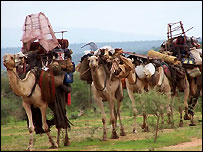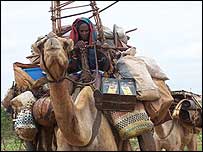Darfur’s nomads under threat
By Jonah Fisher, BBC News.
The two-and-a-half year war in the western region of Darfur is threatening the way of life for Sudan’s Arab nomads.
Sep 1, 2005 — Most people are familiar with the story of Darfur’s war, with reports of government-backed Janjaweed militia rampaging through villages – burning, killing and looting.
 More than 100,000 people have been killed and another 3m displaced from their homes in the conflict and overcrowded refugee camps are full of the people who fled.
More than 100,000 people have been killed and another 3m displaced from their homes in the conflict and overcrowded refugee camps are full of the people who fled.
For the most part, these people are black Africans.
But the cycle of revenge attacks and rebel banditry has left many of Darfur’s Arab population destitute as well.
Beautiful saddles
The last month has brought rain to Darfur and the rugged dry landscape has been transformed into a vivid green.
More than 250,000 Arab nomads in Darfur are continually on the move in this terrain, and it is a challenge to track any of them down.
Travelling in north Darfur, we eventually found a group atop a small hill with their belongings scattered across the ground.
The nomads usually spend two or three nights in each place they stop and put up colourful dome-shaped tents.
They travel in long trains of camels, riding on top of the camels’ hump on beautifully made saddles.
All their belongings are stored in pockets carried by camels at the end of the line.
Fresh grass
The reason they are constantly on the go is because of their livestock – be it camels, cows or goats.
Camels like fresh grass, but if they get too wet they get diseases. So it’s a delicate balancing act.
The migration routes the nomads follow are from north to south.
Before the conflict started two years ago, some groups travelled very long distances.
Now it is dangerous for them to cross rebel-held territory, so they find themselves confined in smaller areas.
“We just travel from Nerteti to Kutum. It’s not a long distance. Some people used to go as far south as the Central African Republic but it’s just not possible for us,” one nomad told me.
Attack
It has been a difficult couple of years for the nomads. One man we spoke to has 12 wives. He inherited 10 of them when six of his brothers were killed in a rebel attack.
 After this meeting, we travelled north to meet another group of nomads.
After this meeting, we travelled north to meet another group of nomads.
Strictly speaking they are ex-nomads.
A year-and-a-half ago they were attacked by rebels, lost most of their animals and stopped travelling.
“Everything was taken in attacks by the rebels in 2004. We had large herds of camels, cows, sheep, goat and even donkeys,” the group’s religious leader Khatir Idriss said.
“We are now three different nomad tribes come here to live together and provide ourselves with some safety.”
I asked him if they were armed.
“Some of us who still have some animals have guns so we can protect ourselves,” he replied.
And this is the essence of these ex-nomads problems: an Arab on camel or horseback sporting a Kalashnikov has become the symbol of Darfur’s evil – the Janjaweed, blamed for driving people from their villages.
If these ex-nomads tried to go to an organised camp they would be seen as the enemy.
Conflict between nomads and farmers has long existed in Darfur. But this war has destroyed any sense of normality for both communities.
